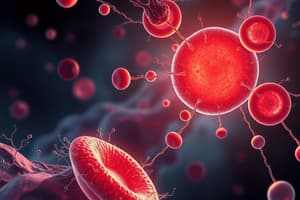Podcast
Questions and Answers
What is the typical lifespan of a platelet once it is released into the peripheral blood?
What is the typical lifespan of a platelet once it is released into the peripheral blood?
- 1-3 days
- 9-11 days (correct)
- 2-4 weeks
- 4-6 days
Which part of the platelet surrounds the granular chromomere and appears clear to light blue in color?
Which part of the platelet surrounds the granular chromomere and appears clear to light blue in color?
- Chromomere
- Megakaryocyte
- Hyalomere (correct)
- Glycocalyx
Where do approximately 30% of circulating platelets get trapped, reducing their circulation to 70%?
Where do approximately 30% of circulating platelets get trapped, reducing their circulation to 70%?
- Liver
- Lungs
- Heart
- Spleen (correct)
Which structure of the platelet membrane is likely derived from the plasma membrane of the megakaryocyte?
Which structure of the platelet membrane is likely derived from the plasma membrane of the megakaryocyte?
Which part of the platelet is granular and located centrally?
Which part of the platelet is granular and located centrally?
What is the color appearance of the hyalomere in a platelet?
What is the color appearance of the hyalomere in a platelet?
What is the main function of the glycoproteins incorporated in the outer layer of the platelet membrane?
What is the main function of the glycoproteins incorporated in the outer layer of the platelet membrane?
Which substance present in platelet electron dense granules helps in contracting blood vessels?
Which substance present in platelet electron dense granules helps in contracting blood vessels?
What is the main role of thrombosthenin in the platelet membrane?
What is the main role of thrombosthenin in the platelet membrane?
Which component of platelet cytoplasm is responsible for fatty acid metabolism?
Which component of platelet cytoplasm is responsible for fatty acid metabolism?
Which types of granules found in platelets are rich in Ca++ and Mg++ ions?
Which types of granules found in platelets are rich in Ca++ and Mg++ ions?
Which statement accurately describes the role of lysosomes in platelets?
Which statement accurately describes the role of lysosomes in platelets?
What happens to the cytoplasmic basophilia of a mature megakaryocyte?
What happens to the cytoplasmic basophilia of a mature megakaryocyte?
How are platelets produced from megakaryocytes?
How are platelets produced from megakaryocytes?
What stimulates platelet production?
What stimulates platelet production?
What happens to a megakaryocyte's nucleus when its cytoplasm is broken away for platelet production?
What happens to a megakaryocyte's nucleus when its cytoplasm is broken away for platelet production?
What happens to a nucleus without cytoplasm in the bone marrow?
What happens to a nucleus without cytoplasm in the bone marrow?
How does the size of a megakaryocyte's cytoplasmic mass affect platelet production?
How does the size of a megakaryocyte's cytoplasmic mass affect platelet production?
Flashcards are hidden until you start studying
Study Notes
Platelet Lifespan and Structure
- Platelets typically have a lifespan of 7 to 10 days once released into peripheral blood.
- The hyalomere, which surrounds the granular chromomere, appears clear to light blue in color.
Platelet Circulation and Trapping
- About 30% of circulating platelets become trapped in the spleen, reducing the active circulating pool to approximately 70%.
Platelet Membrane Structure
- The open canalicular system of the platelet membrane is likely derived from the plasma membrane of the megakaryocyte.
Granular Composition and Function
- The granular portion of the platelet, located centrally, is known as the granules.
- The hyalomere appears light blue, distinguishing it from denser areas in the platelet.
Glycoproteins and Function
- Glycoproteins in the outer layer of the platelet membrane primarily function in adhesion and platelet aggregation.
Electron Dense Granules
- Substances in platelet electron dense granules, like serotonin, help in the contraction of blood vessels.
Thrombosthenin and Cytoplasmic Components
- Thrombosthenin plays a critical role in platelet contraction and helps in stabilization during aggregation.
- The platelet cytoplasm contains mitochondria, which are responsible for fatty acid metabolism.
Granule Composition
- Platelets contain dense granules rich in Ca++ and Mg++ ions which are essential for various signaling pathways and clotting mechanisms.
Lysosomes in Platelets
- Lysosomes in platelets assist in the breakdown of waste materials and damaged organelles, contributing to overall platelet health.
Megakaryocyte Changes
- The cytoplasmic basophilia of mature megakaryocytes decreases as they mature.
- Platelets are produced from megakaryocytes through a process called megakaryopoiesis, where cytoplasmic fragmentation occurs.
Stimulation and Nucleus Behavior
- Thrombopoietin is the main stimulus for platelet production.
- When cytoplasm is broken away for platelet production, the megakaryocyte's nucleus becomes polyploid.
- A nucleus without cytoplasm typically undergoes apoptosis or remains quiescent in the bone marrow.
Megakaryocyte Size and Platelet Yield
- The size of a megakaryocyte's cytoplasmic mass correlates with higher platelet production; larger megakaryocytes produce more platelets due to increased cytoplasmic fragmentation.
Studying That Suits You
Use AI to generate personalized quizzes and flashcards to suit your learning preferences.




